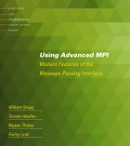Home
Publications
edited volumes
Awards
Research
Teaching
Miscellaneous
Full CV [pdf]
ew-hoefe
BLOG
bio


Events





Past Events






|
Publications of Torsten Hoefler
Johannes de Fine Licht, Christopher A. Pattison, Alexandros Nikolaos Ziogas, David Simmons-Duffin, Torsten Hoefler:
| | | Fast Arbitrary Precision Floating Point on FPGA
(In Proceedings of the 30th IEEE International Symposium on Field-Programmable Custom Computing Machines (FCCM'22), May 2022)
Publisher Reference
AbstractNumerical codes that require arbitrary precision floating point (APFP) numbers for their core computation are dominated by elementary arithmetic operations due to the super-linear complexity of multiplication in the number of mantissa bits. APFP computations on conventional software-based architectures are made exceedingly expensive by the lack of native hardware support, requiring elementary operations to be emulated using instructions operating on machine-word-sized blocks. In this work, we show how APFP multiplication on compile-time fixed-precision operands can be implemented as deep FPGA pipelines with a recursively defined Karatsuba decomposition on top of native DSP multiplication. When comparing our design implemented on an Alveo U250 accelerator to a dual-socket 36-core Xeon node running the GNU Multiple Precision Floating-Point Reliable (MPFR) library, we achieve a 9.8x speedup at 4.8 GOp/s for 512-bit multiplication, and a 5.3x speedup at 1.2 GOp/s for 1024-bit multiplication, corresponding to the throughput of more than 351x and 191x CPU cores, respectively. We apply this architecture to general matrix-matrix multiplication, yielding a 10x speedup at 2.0 GMAC/s over the Xeon node, equivalent to more than 375x CPU cores, effectively allowing a single FPGA to replace a small CPU cluster. Due to the significant dependence of some numerical codes on APFP, such as semidefinite program solvers, we expect these gains to translate into real-world speedups. Our configurable and flexible HLS-based code provides as high-level software interface for plug-and-play acceleration, published as an open source project.
DocumentsPublisher URL: https://ieeexplore.ieee.org/document/9786219download article: 
download slides: 
| | | BibTeX | @inproceedings{,
author={Johannes de Fine Licht and Christopher A. Pattison and Alexandros Nikolaos Ziogas and David Simmons-Duffin and Torsten Hoefler},
title={{Fast Arbitrary Precision Floating Point on FPGA}},
year={2022},
month={May},
booktitle={Proceedings of the 30th IEEE International Symposium on Field-Programmable Custom Computing Machines (FCCM'22)},
source={http://www.unixer.de/~htor/publications/},
} |
|
|



























